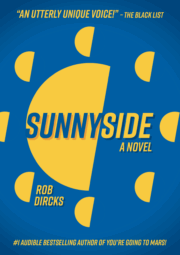Things to Ask Your Agent
by Eva Scalzo
 Ever so often, I’ll have a client apologize for asking me a question, but honestly, any agent worth their weight in gold will tell you to never apologize for asking them anything. I want my clients to ask me all the things they can think of, because it’s the best way to leverage my expertise for themselves. It’s also the best way to avoid misunderstandings or confusion that can sour an author-agent relationship.
Ever so often, I’ll have a client apologize for asking me a question, but honestly, any agent worth their weight in gold will tell you to never apologize for asking them anything. I want my clients to ask me all the things they can think of, because it’s the best way to leverage my expertise for themselves. It’s also the best way to avoid misunderstandings or confusion that can sour an author-agent relationship.
There are things you want to be sure you’re asking beginning on that first call, when you’re trying to see if an agent will be a good fit for you. First you must ask yourself a very important question: what do I want out of a literary agent? And be sure you have a solid answer for it, because this answer will serve as a guide to the questions you should ask your prospective agent. Do you want an agent who will help polish and refine your work? Ask the agent about their editorial process. Some agents are not editorial at all, some have a light hand, some a heavy one, not everyone’s style will work for you and this is probably one of the most important questions you’ll ask.
Another key question is: How often do you want to communicate with your agent? Want someone who checks in periodically via email? Do you want weekly calls? Do you want someone who will text you back if you have a panic attack in the middle of the night? There is no one standard way of interacting with authors from an agent perspective. Asking them about their communication style and how they tailor it to their author’s needs is important. Here too it’s also good to reach out to the author’s current clients and see what they say about how the agent communicates with them. Be sure to ask any prospective agent for some current client contacts.
Asking agents about their submission process, what the marketplace is like for your manuscript, what their representation agreement entails, and whether or not they are looking to be a long term partner or just want to sign you for the current project, will help you find that perfect match.
Once they’ve answered those questions, and you’ve signed your representation agreement, you shouldn’t stop asking questions. You should ask your agent what the next steps are, whether the manuscript needs rounds of revisions or is ready to go out on submission. You can ask them what you need to do to build or improve your platform.
If you get a book deal, be sure to read the deal memo and contract and ask your agent about what the terms are and what they mean for you. Did you get an advance? Ask your agent how it pays out and what earning it out will entail. Agents aren’t usually financial advisors, but they can point you to resources on how to account for advances from an author perspective. Once that contract is signed and your book is in edits, if you are a first-time author you are bound to have more questions. Ask your agent what is expected of you. Are you supposed to accept every change an editor requests? Okay, the answer to that one is no, but your agent can help you navigate this.
Have an overwhelming edit letter that you’re not sure how to handle? Ask your agent for help navigating the editorial comments. Are there things you disagree with? Ask your agent for help with strategizing how to talk about it with your editor. Unsure of what happens after acceptance? Ask your agent for an overview of the process; as your industry expert they should know these things even if every publisher handles things slightly differently.
In sum, you should be able to ask your agent about anything publishing related. Even if they don’t have all the answers, they’ll be able to get them for you.
•••
Eva Scalzo was born in New Jersey, but has lived in Houston, Buenos Aires, San Juan, and Boston before settling down outside of Binghamton, New York. She has a B.A. in the Humanities from the University of Puerto Rico and a M.A. in Publishing and Writing from Emerson College. Since graduating in 2002, she has spent her career in scholarly publishing, working for Houghton Mifflin, Blackwell Publishing, John Wiley & Sons, and Cornell University in a variety of roles. She joined Speilburg Literary as a literary agent in 2017 and represents Romance, Science Fiction, Fantasy, and Young Adult fiction.


